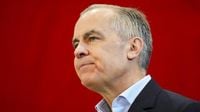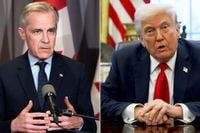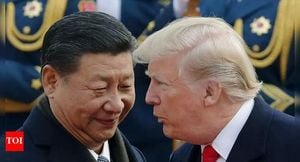In a politically charged atmosphere ahead of the Canadian elections, Prime Minister Mark Carney is facing intense scrutiny over his recent phone call with U.S. President Donald Trump. The conversation, which took place on March 28, has become a focal point in the campaign, particularly after Carney confirmed that Trump raised the contentious issue of making Canada the 51st state.
Carney, who leads the Liberal Party, initially portrayed the call positively, stating that Trump respected Canada as a sovereign nation. However, a report by Radio-Canada revealed that Trump did indeed mention the 51st state, a claim Carney later acknowledged during a campaign press conference on April 24, 2025.
“The president brings this up all the time. He brought it up yesterday. He brought it up before,” Carney told reporters, emphasizing that he firmly rejected the notion of Canada becoming part of the United States. “To be clear, as I’ve said to anyone who’s raised this issue in private or in public, including the president, it will never happen,” he asserted.
Yves-François Blanchet, leader of the Bloc Québécois, criticized Carney's handling of the situation, accusing him of misrepresenting the nature of the conversation. Blanchet stated, “He wanted to make a statement: ‘I am Mark Carney. I am the best of them all. I’m a great negotiator.’” He expressed skepticism about Carney's claims, questioning, “If that is not true, what else is not true?”
The political landscape is further complicated by Trump's tariffs on Canadian goods, including a 25% tariff on automobiles, which has been a significant issue during the election campaign. Conservative Leader Pierre Poilievre has condemned these tariffs and stated that Canada must stand firm against any attempts to undermine its sovereignty.
During the campaign, which is heating up as election day approaches, Carney has attempted to position himself as the leader capable of effectively dealing with Trump’s policies. His messaging has sought to reassure Canadians that he will protect the nation’s interests. However, the ongoing controversy surrounding his remarks about the call with Trump has raised questions about his credibility.
Polls indicate that the Liberal Party holds a slight lead over the Conservatives, but the margin is tightening as more than 7 million Canadians have already cast their votes in early elections. The election, set for April 28, 2025, is being influenced heavily by public sentiment regarding Trump’s presidency and his remarks about Canada.
At a campaign event in Coquitlam, B.C., Carney reiterated his stance on Canadian sovereignty, stating, “This is Canada. We decide what happens here.” He also emphasized the need for a new approach to the relationship with the United States, especially in light of Trump’s recent comments that Canada would be better off as a U.S. state.
As the election draws near, the rhetoric surrounding Trump’s influence continues to dominate discussions among voters. Many Canadians express concerns about the tariffs and the implications of Trump’s comments on their national identity. In discussions with voters, issues like the cost of living, trade relations, and the need for strong leadership in the face of U.S. pressures have emerged as critical factors influencing their choices at the polls.
In a recent interview, voter Patrick George mentioned, “The tariffs, the situation with the United States, cost of living... I have kids, and this is the only planet we have, so I’m quite worried about that.” Another voter, Paula Readyhough, highlighted the significance of “the Trump situation” in her decision-making process.
The political stakes are high as leaders from all parties continue to campaign vigorously. Carney’s ability to navigate the complexities of his relationship with Trump while maintaining a strong stance on Canadian sovereignty will be pivotal in determining the outcome of the election.
Despite the challenges, Carney’s campaign has garnered support from some voters who believe he is the right man for the job. “I think he should have left sooner,” said Mike Gabriel, a voter who previously supported the Liberals but feels more confident with Carney at the helm.
As the final days of the campaign unfold, the focus will remain on how Carney addresses the fallout from his conversation with Trump and whether he can solidify his position as a leader who can effectively represent Canada on the world stage.
In summary, the upcoming election is shaping up to be a referendum on leadership in the face of external pressures, particularly from the United States. Carney’s handling of the Trump conversation will likely play a crucial role in shaping voter perceptions and, ultimately, the election's outcome.




